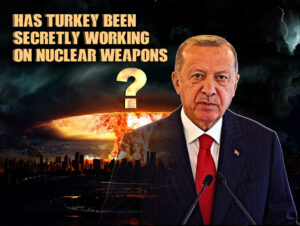 Some months ago it became known that the German Intelligence Service (Bundesnachrichtendienst – BND) was spying on Turkey. Turkey’s political leadership was none too happy. Yet the BND has good reasons to keep a watchful eye on Ankara. It is not only the crises in Iraq and Syria, drug-smuggling, people-trafficking and the activities of the PKK that make Turkey a legitimate target for German intelligence. For quite some time, evidence is mounting that Ankara is trying to acquire nuclear weapons. The likelihood of a Turkish nuclear weapons program has increased dramatically. Simply put: the Western intelligence community now largely agrees that Turkey is working both on nuclear weapon systems and on their means of delivery. Iran is the model to emulate. Consequently, Turkey has started a large-scale civilian nuclear program, justified by the country’s urgent energy needs. In 2011, Turkey concluded a $20bn contract with the Russian company ROSATOM on a large reactor complex. Two years later, a similar agreement was concluded with a Japanese-French consortium, this time over $22bn. President Erdogan also announced yet another power plant, to be built entirely by indigenous personnel.
Some months ago it became known that the German Intelligence Service (Bundesnachrichtendienst – BND) was spying on Turkey. Turkey’s political leadership was none too happy. Yet the BND has good reasons to keep a watchful eye on Ankara. It is not only the crises in Iraq and Syria, drug-smuggling, people-trafficking and the activities of the PKK that make Turkey a legitimate target for German intelligence. For quite some time, evidence is mounting that Ankara is trying to acquire nuclear weapons. The likelihood of a Turkish nuclear weapons program has increased dramatically. Simply put: the Western intelligence community now largely agrees that Turkey is working both on nuclear weapon systems and on their means of delivery. Iran is the model to emulate. Consequently, Turkey has started a large-scale civilian nuclear program, justified by the country’s urgent energy needs. In 2011, Turkey concluded a $20bn contract with the Russian company ROSATOM on a large reactor complex. Two years later, a similar agreement was concluded with a Japanese-French consortium, this time over $22bn. President Erdogan also announced yet another power plant, to be built entirely by indigenous personnel.
If Turkey had indeed been the “fourth customer” of the Pakistani nuclear smuggler network, Abdul Qadeer Khan, one must assume that the country is now in possession of all documentation necessary to build a bomb. And even if Turkey had not been the fourth customer, one must assume that, given the long cooperation on the production of centrifuges, Khan did instruct his preferred partner not just in how to use centrifuges, but also in weaponization.
In February 2020, Turkey and Pakistan joined hands to bolster defence ties.
According to reports, Pakistan has a tie up with Saudi Arabia that when need arises, Pakistan would provide nuclear weapons to Saudi Arabia owing to the fact that Saudi Arabia had funded Pakistan’s nuclear program. Hence, there is little scope to believe that Pakistan would not indulge in a similar arrangement with Turkey to provide nuclear weapons.
According to a Jerusalem Post quote, “in the 2000s, Turkey was a covert industrial hub for the nuclear black market of rogue Pakistani scientist Abdul Qadeer Khan. Khan’s network offered buyers a menu of both technical expertise and the materials to make a bomb. The electronics parts of the centrifuges, the most important items in this covert trade, were from Turkey.”
Hence, nuclear links between Pakistan and Turkey have long existed.
The question then is would Turkey utilize the nuclear technology of Pakistan?
Pakistan has invited Turkey to invest in its energy sectors and also participate in the China Pakistan Economic Corridor (CPEC). Last year, Erdogan has also helped Pakistan escape a huge penalty in a litigation involving a Turkish power company, Karkey Karadeniz Elektrik Uretim that involved $1.2 billion imposed by the International Centre for Settlement of Investment Dispute. In 2019, Pakistan-Iran-Turkey also signed the International Road Transport agreement to create a trade- corridor. Thus growing cooperation between Pakistan and Turkey is clearly visible.
Even if Turkey does not acquire entire weapon system, it could acquire know how to develop nuclear weapons from Pakistan.
In fact, if Iran-Turkey relations improve considerably, Pakistan could also have a joint cooperation mechanism to train Iranian and Turkish scientists on nuclear weapon technology.
Turkey already possesses nuclear reactors and hence, they could gain nuclear expertise to pursue nuclear weapons development program in their own country than getting it from Pakistan to avoid any proliferation accusations against itself.
Nevertheless, whether Turkey chooses to acquire nuclear weapons technology directly from Pakistan or just the know-how, would be driven by Turkey’s urgency of acquiring nuclear weapons and how well it is prepared to face international pressures.
Irrespective of any of the above decisions, Turkey would face stiff pressures from the international community.
But providing nuclear weapons technology to Turkey, would also invite international sanctions against Pakistan- a move that would adversely affect Pakistan’s economic condition which already is in doldrums.
Is Pakistan ready to accept this risk? Also, see the following:
References
How Pakistan’s A.Q. Khan Helped North Korea Get the Bomb
View: China, Turkey And Pakistan’s Unholy Nuclear Nexus And Its Global Ramifications




